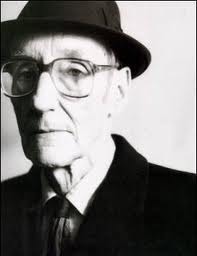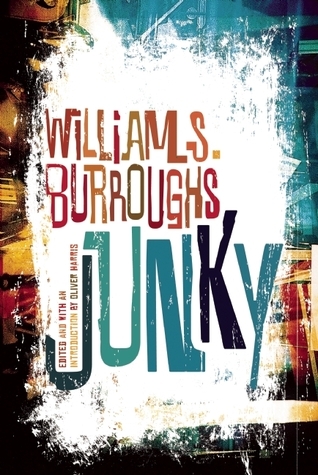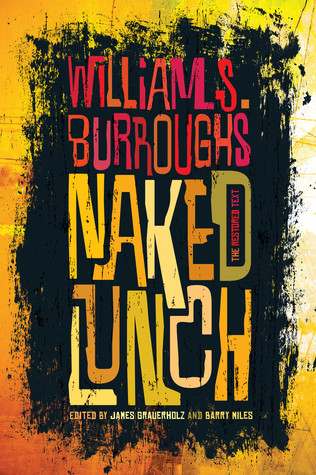 William Seward Burroughs II, (also known by his pen name William Lee; February 5, 1914 – August 2, 1997) was an American novelist, short story writer, essayist, painter, and spoken word performer. A primary figure of the Beat Generation and a major postmodernist author, he is considered to be “one of the most politically trenchant, culturally influential, and innovative artists of the 20th century”. His influence is considered to have affected a range of popular culture as well as literature. Burroughs wrote 18 novels and novellas, six collections of short stories and four collections of essays. Five books have been published of his interviews and correspondences. He also collaborated on projects and recordings with numerous performers and musicians, and made many appearances in films.
William Seward Burroughs II, (also known by his pen name William Lee; February 5, 1914 – August 2, 1997) was an American novelist, short story writer, essayist, painter, and spoken word performer. A primary figure of the Beat Generation and a major postmodernist author, he is considered to be “one of the most politically trenchant, culturally influential, and innovative artists of the 20th century”. His influence is considered to have affected a range of popular culture as well as literature. Burroughs wrote 18 novels and novellas, six collections of short stories and four collections of essays. Five books have been published of his interviews and correspondences. He also collaborated on projects and recordings with numerous performers and musicians, and made many appearances in films.
He was born to a wealthy family in St. Louis, Missouri, grandson of the inventor and founder of the Burroughs Corporation, William Seward Burroughs I, and nephew of public relations manager Ivy Lee. Burroughs began writing essays and journals in early adolescence. He left home in 1932 to attend Harvard University, studied English, and anthropology as a postgraduate, and later attended medical school in Vienna. After being turned down by the Office of Strategic Services and U.S. Navy in 1942 to serve in World War II, he dropped out and became afflicted with the drug addiction that affected him for the rest of his life, while working a variety of jobs. In 1943 while living in New York City, he befriended Allen Ginsberg and Jack Kerouac, the mutually influential foundation of what became the countercultural movement of the Beat Generation.
Much of Burroughs’s work is semi-autobiographical, primarily drawn from his experiences as a heroin addict, as he lived throughout Mexico City, London, Paris, Berlin, the South American Amazon and Tangier in Morocco. Finding success with his confessional first novel, Junkie (1953), Burroughs is perhaps best known for his third novel Naked Lunch (1959), a controversy-fraught work that underwent a court case under the U.S. sodomy laws. With Brion Gysin, he also popularized the literary cut-up technique in works such as The Nova Trilogy (1961–64). In 1983, Burroughs was elected to the American Academy and Institute of Arts and Letters, and in 1984 was awarded the Ordre des Arts et des Lettres by France. Jack Kerouac called Burroughs the “greatest satirical writer since Jonathan Swift”, a reputation he owes to his “lifelong subversion” of the moral, political and economic systems of modern American society, articulated in often darkly humorous sardonicism. J. G. Ballard considered Burroughs to be “the most important writer to emerge since the Second World War”, while Norman Mailer declared him “the only American writer who may be conceivably possessed by genius”.
Burroughs had one child, William Seward Burroughs III (1947-1981), with his second wife Joan Vollmer. Vollmer died in 1951 in Mexico City. Burroughs was convicted of manslaughter in Vollmer’s death, an event that deeply permeated all of his writings. Burroughs died at his home in Lawrence, Kansas, after suffering a heart attack in 1997.
Books

Junky
Junk is not, like alcohol or a weed, a means to increased enjoyment of life. Junk is not a kick. It is a way of life.
In his debut novel, Junky, Burroughs fictionalized his experiences using and peddling heroin and other drugs in the 1950s into a work that reads like a field report from the underworld of post-war America. The Burroughs-like protagonist of the novel, Bill Lee, see-saws between periods of addiction and rehab, using a panoply of substances including heroin, cocaine, marijuana, paregoric (a weak tincture of opium) and goof balls (barbiturate), amongst others. For this definitive edition, renowned Burroughs scholar Oliver Harris has gone back to archival typescripts to re-created the author’s original text word by word. From the tenements of New York to the queer bars of New Orleans, Junky takes the reader into a world at once long-forgotten and still with us today. Burroughs’s first novel is a cult classic and a critical part of his oeuvre.

Naked Lunch
The book is structured as a series of loosely connected vignettes. Burroughs stated that the chapters are intended to be read in any order. The reader follows the narration of junkie William Lee, who takes on various aliases, from the U.S. to Mexico, eventually to Tangier and the dreamlike Interzone.
The vignettes are drawn from Burroughs’ own experiences in these places and his addiction to drugs (heroin, morphine, and while in Tangier, majoun as well as a German opioid, brand name Eukodol, of which he wrote frequently).

The Soft Machine
In Naked Lunch, William S. Burroughs revealed his genius. In The Soft Machine he begins an adventure that will take us even further into the dark recesses of his imagination, a region where nothing is sacred, nothing taboo. Continuing his ferocious verbal assault on hatred, hype, poverty, war, bureaucracy, and addiction in all its forms, Burroughs gives us a surreal space odyssey through the wounded galaxies in a book only he could create.
A paranoid is someone who knows a little of what’s going on. A psychotic is a guy who’s just found out what’s going on.
Whether you sniff it smoke it eat it or shove it up your ass the result is the same: addiction.
I don’t care if people hate my guts; I assume most of them do. The important question is whether they are in a position to do anything about it.
Nobody owns life, but anyone who can pick up a frying pan owns death.
There is no intensity of love or feeling that does not involve the risk of crippling hurt. It is a duty to take this risk, to love and feel without defense or reserve.
You were not there for the beginning. You will not be there for the end. Your knowledge of what is going on can only be superficial and relative
Writers, like elephants, have long, vicious memories. There are things I wish I could forget.
In the U.S. you have to be a deviant or die of boredom.

